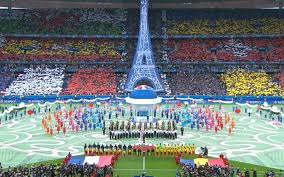By Paul Nicholson
September 14 – While UEFA’s federation chiefs were making their way to Congress and the vote for president in Athens, their team coaches and technical directors were wrapping up their own forum in Paris. At the core of their agenda was an analysis of the EURO 2016 finals and the tactical and technical trends that emerged.
The first time the tournament had been played by 24 rather than 16 nations was always going to bring a different perspective and viewpoint to the coaching debate and the Euro 2016 technical report acknowledges the changes in the way the tournament developed as opposed to previous editions.
At the top of that analysis were what the report calls the “tales of the unexpected” – in particular the progression of Iceland and Wales to the quarter-finals and semi-finals respectively. “Iceland and Wales helped make the tournament,” said Sir Alex Ferguson. “These teams created a great impression.”
They may have created a great impression in terms of David vs Goliath storylines, but the report does not shy away from what was an emphasis on defensive systems.
The technical report notes: “The tournament was rich in contests between teams who set out to prise doors open and those who were more concerned about keeping the bolt across.”
So not a great tournament for free-flowing end-to-end football, but a tournament that was still competitive with tactically well-organised teams. One fear had been that the regularly Euro-qualifying big nations would hammer the tournament newcomers – this didn’t happen and infact big scalps were taken.
“A lot of work went into defensive structures,” EURO technical team member Thomas Schaaf said. “Attacking play was based on safe defensive organisation. Teams were very compact, and got back into defensive positions quickly after attacking.”
The report has a very full analysis of the stats and different coaches and commentators will interpret them differently, depending on their points of view. But the stats do show a tournament that produced fewer goals and less open play goal-mouth action.
– Almost 30% of the 108 goals scored in France were from set plays. A 21% increase on EURO 2012 – and 19 of the set-play goals were opening goals.
– The average number of goals per game was 2.12, compared with 2.45 at UEFA EURO 2012. Only 69 goals were scored in the 36 group matches, producing an average of 1.92 per game.
– 39 goals in 15 knockout games pushed the tournament average up to 2.12 per match but overall there was a downturn of 13.5% in the number of goals.
– In the group stages forwards accounted for 29 goals, midfielders 32 and defenders 6. With forwards accounting for 12 of the tournament’s last 20 goals, the final balance read: 47 by forwards, 45 by midfielders and 13 by defenders. The other 3 were own goals.
– The number of headed goals fell sharply from the record level of 29% set at EURO 2012 to 22% in France.
– Of the 24 headed goals scored at UEFA EURO 2016, five came from corner kicks, four from free-kicks, and the remainder from crosses or cutbacks.
– 19 of the 69 group stage goals were scored from the 80th minute or later. 7 group stage goals were scored in added time
– Of 108 goals, less than a fifth were scored in the first half hour of play
– Substitutes were responsible for 17.6% of all goals
– At EURO 2008, 46% of the open-play goals stemmed from counterattacks. By EURO 2012, that had been halved to 23% and it was at that level in 2016. But the statistics are a little deceptive as a high percentage of goal-scoring counterattacks occurred while the clock was ticking down.
A copy of the technical report can be seen at http://www.uefa.org/MultimediaFiles/Download/TechnicalReport/competitions/EURO/02/40/26/69/2402669_DOWNLOAD.pdf
UEFA chief technical officer Ioan Lupescu said: “[the report] offers analysis, reflections and debating points which we hope will also be of value to coaches who are active at the development levels of the game, helping them to work on the skills and qualities needed by the elite performers of the future.”
A special tribute was paid at the conference to Portugal’s Euro 2016-winning coach Fernando Santos. Sir Alex Ferguson also presented an award to Spanish coach Vicente del Bosque, who is retiring after having led Spain to EURO and FIFA World Cup titles with a style of play that changed international football.
Contact the writer of this story at moc.l1713581763labto1713581763ofdlr1713581763owedi1713581763sni@n1713581763osloh1713581763cin.l1713581763uap1713581763

